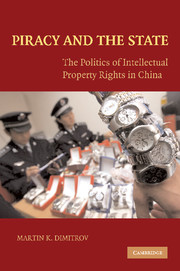Book contents
- Frontmatter
- Contents
- List of Tables
- List of Figures and GIS Maps
- Acknowledgments
- List of Abbreviations
- I INTRODUCTION
- II THE ORGANIZATION OF THE STATE: IPR ENFORCEMENT OPTIONS
- 3 Customs: Centralization without Rationalization
- 4 Courts: The Emergence of Rationalization
- 5 Administrative Enforcement: The Complex State
- 6 Criminal Enforcement: The Failure of Coordination
- III THE STATE IN ACTION: THE POLITICS OF IPR ENFORCEMENT IN CHINA
- IV CONCLUSION
- Glossary of Selected Chinese Terms
- Index
5 - Administrative Enforcement: The Complex State
Published online by Cambridge University Press: 06 November 2009
- Frontmatter
- Contents
- List of Tables
- List of Figures and GIS Maps
- Acknowledgments
- List of Abbreviations
- I INTRODUCTION
- II THE ORGANIZATION OF THE STATE: IPR ENFORCEMENT OPTIONS
- 3 Customs: Centralization without Rationalization
- 4 Courts: The Emergence of Rationalization
- 5 Administrative Enforcement: The Complex State
- 6 Criminal Enforcement: The Failure of Coordination
- III THE STATE IN ACTION: THE POLITICS OF IPR ENFORCEMENT IN CHINA
- IV CONCLUSION
- Glossary of Selected Chinese Terms
- Index
Summary
Administrative agencies play a much larger role in IPR enforcement in China than do the civil courts discussed in the previous chapter. InChapter 3, we analyzed the activity of Customs, an administrative agency that has a relatively clear enforcement portfolio because of its focus on the border protection of IPR. The enforcement situation is much more complex for IPR administrative protection internally within individual countries. In China, more than a dozen agencies have general or specialized jurisdiction over the administrative protection of IPR. This chapter introduces these agencies, provides data about the volume of their enforcement activity, and compares them with similar agencies in the other five countries analyzed in this book. For reasons of clarity, I note that when I refer to administrative enforcement, I mean enforcement provided by these agencies. Nonadministrative enforcement refers to the enforcement supplied by the courts, by the police, and, at the border, by Customs.
Table 5.1 presents a snapshot of cross-national administrative enforcement efforts in 2004. It provides aggregate statistics on the work of the courts, Customs, the police, and all administrative agencies with an IPR enforcement portfolio. The enforcement effort of these agencies is measured as enforcement cases per million people. Several patterns are immediately apparent. In most countries there is relative parity between administrative and nonadministrative enforcement. There are two exceptions to this rule. In the United States, administrative agencies are virtually never used to provide enforcement, as reflected in the 1:585 ratio of administrative to nonadministrative enforcement.
- Type
- Chapter
- Information
- Piracy and the StateThe Politics of Intellectual Property Rights in China, pp. 115 - 145Publisher: Cambridge University PressPrint publication year: 2009

